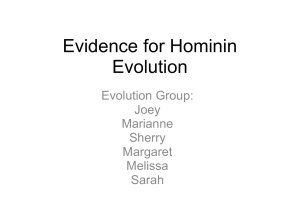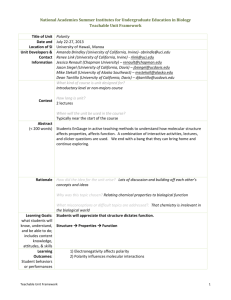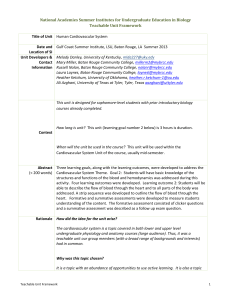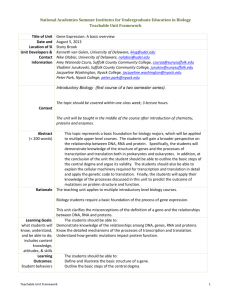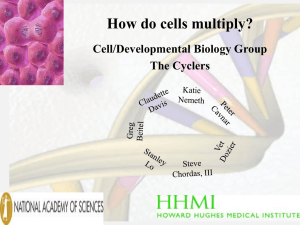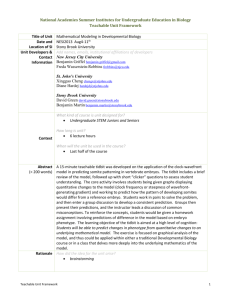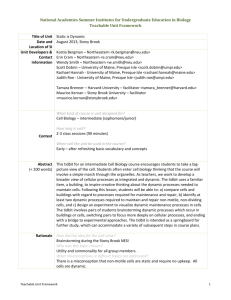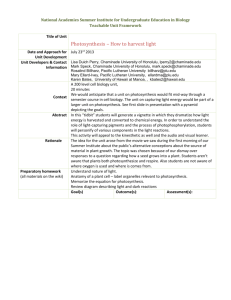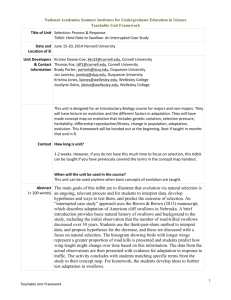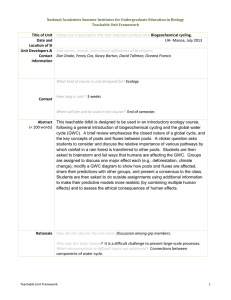Cellular Division and Cell Cycle (framework) Mountain West 2013
advertisement
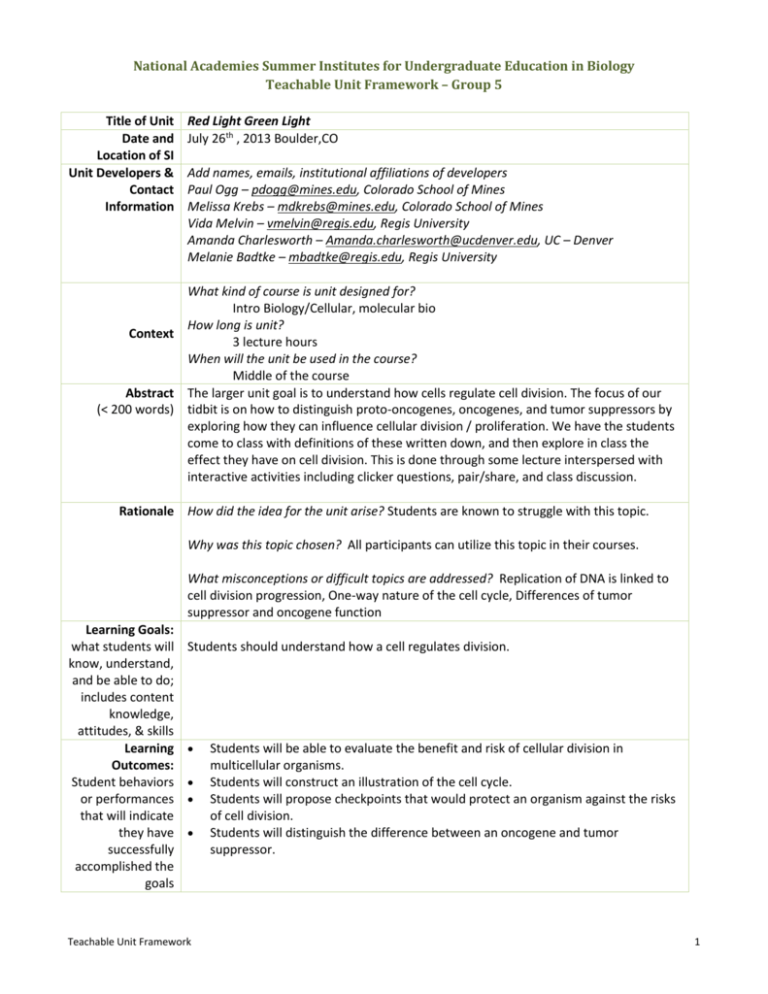
National Academies Summer Institutes for Undergraduate Education in Biology Teachable Unit Framework – Group 5 Title of Unit Date and Location of SI Unit Developers & Contact Information Red Light Green Light July 26th , 2013 Boulder,CO Add names, emails, institutional affiliations of developers Paul Ogg – pdogg@mines.edu, Colorado School of Mines Melissa Krebs – mdkrebs@mines.edu, Colorado School of Mines Vida Melvin – vmelvin@regis.edu, Regis University Amanda Charlesworth – Amanda.charlesworth@ucdenver.edu, UC – Denver Melanie Badtke – mbadtke@regis.edu, Regis University What kind of course is unit designed for? Intro Biology/Cellular, molecular bio How long is unit? Context 3 lecture hours When will the unit be used in the course? Middle of the course Abstract The larger unit goal is to understand how cells regulate cell division. The focus of our (< 200 words) tidbit is on how to distinguish proto-oncogenes, oncogenes, and tumor suppressors by exploring how they can influence cellular division / proliferation. We have the students come to class with definitions of these written down, and then explore in class the effect they have on cell division. This is done through some lecture interspersed with interactive activities including clicker questions, pair/share, and class discussion. Rationale How did the idea for the unit arise? Students are known to struggle with this topic. Why was this topic chosen? All participants can utilize this topic in their courses. What misconceptions or difficult topics are addressed? Replication of DNA is linked to cell division progression, One-way nature of the cell cycle, Differences of tumor suppressor and oncogene function Learning Goals: what students will know, understand, and be able to do; includes content knowledge, attitudes, & skills Learning Outcomes: Student behaviors or performances that will indicate they have successfully accomplished the goals Students should understand how a cell regulates division. Teachable Unit Framework Students will be able to evaluate the benefit and risk of cellular division in multicellular organisms. Students will construct an illustration of the cell cycle. Students will propose checkpoints that would protect an organism against the risks of cell division. Students will distinguish the difference between an oncogene and tumor suppressor. 1 National Academies Summer Institutes for Undergraduate Education in Biology Teachable Unit Framework – Group 5 Incorporation of Scientific Teaching Themes Active Learning How students will engage actively in learning the concepts Assessment How teachers will measure learning; how students will selfevaluate learning Activities outside of class: Pre-assessments: Pre-class quiz Homework Pre-class quiz Diversity How the unit is designed to include participants with a variety of experiences, abilities, and characteristics Variety of teaching styles to transmit information in different ways. Post-tidbit assessments: Activities in class: Discussion of pre-class quiz Clicker questions Pair/share Group discussion Exam Homework questions Exam question(s) Activities during tidbit: Clicker questions Pair/share Group discussion Teachable Unit Framework 2 National Academies Summer Institutes for Undergraduate Education in Biology Teachable Unit Framework – Group 5 Sample Presentation Plan (general schedule with approximate timing for unit) Time (min) Learning Outcome(s) Preclass Activity/assessment Explanation, notes, suggestions, tips Pre-Class quiz Define proto-oncogene, oncogene, tumor suppressor and their functions. Enter approx. class time for learning activity preparatory material presentation Enter approx. class time for learning activity #1 Go over answers to preclass quiz briefly 3 minutes Clicker question 2 minutes Enter approximate time for additional learning activities 13 minutes and associated class Work/preparatory materials Enter approximate time for post-activity summing up or 2 minutes transition Teachable Unit Framework Clicker questions Pair / share Group discussion 3 National Academies Summer Institutes for Undergraduate Education in Biology Teachable Unit Framework – Group 5 Add additional activities information as needed for the unit. Resources for Teaching the Unit (other files and information needed/helpful to teach the unit, including files for papers from which original data for class activities is taken, supporting information for the instructor, handouts, in class activities materials, assessments with answer keys, homework assignments, etc.) Effectiveness of unit (if you have used it in your own teaching) Acknowledgements •Molly Bolger and Lianna Etchberger (Facilitators) •Groups 1 and 6 (provided us substantial input) Teachable Unit Framework 4
